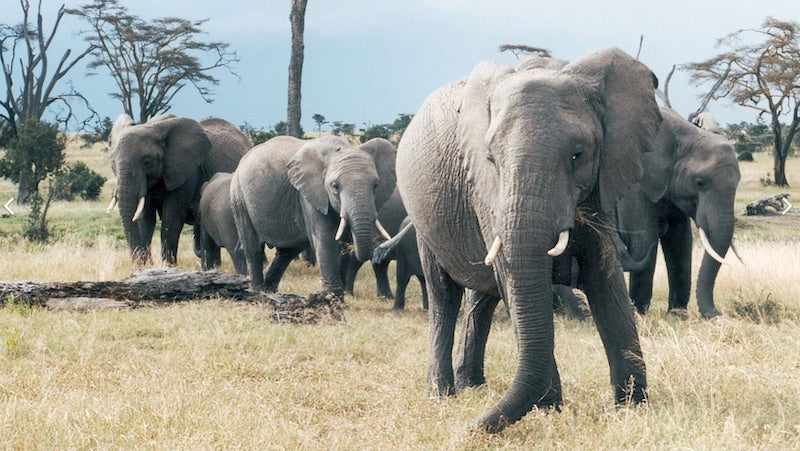Did you know that one of the terms for a group of elephants is “a memory of elephants”?
With the approach of Remembrance Day on November 11th I’ve been thinking a lot about memory. I’ve also been thinking about elephants, and their capacity to remember. Is it really true as the saying goes, that ‘elephants never forget’? Is there any basis to the expression, ‘she has the memory of an elephant’? Is the collective term “a memory of elephants” well earned? And, if so, what can we learn from elephants who never forget?
Two elephants at The Elephant Sanctuary in Hohenwald, Tennessee, give us an indication of the truth behind these expressions. A 2009 article in Scientific Americanreported that the Sanctuary in Tennessee added Shirley the elephant to its existing elephant population which already included Jenny. The pair immediately began closely examining each other. The sanctuary director Carol Buckley described the euphoric scene that quickly ensued. “Shirley started bellowing, and Jenny did, too. Both trunks were checking out each other’s scars. I’ve never seen anything that intense without it being aggression.” Turns out the ladies remembered each other from years before. Director Buckley dug into the history of the two elephants and discovered that Jenny and Shirley had briefly performed together 23 years earlier in the Carson & Barnes Circus.
Oxford trained Zoologist Dr. Iain Douglas-Hamilton, founder of the Save the Elephants organization in Nairobi, Kenya, also experienced the marvel of elephant memory. While doing research as a young scientist in Lake Manyara National Park in Tanzania Dr. Douglas-Hamilton befriended a female elephant who always joined him for his daily walks in the bush. Dr. Douglas-Hamilton then left Tanzania to complete his doctorate at Oxford. When Dr. Douglas-Hamilton returned to Lake Manyara National Park four years later the same female elephant immediately sidled up to him and strolled side by side with Dr. D-H as if he had never left.
This remarkable ability to remember has been key in the elephants’ capacity to survive and thrive throughout time."They're long-lived animals,” says Dr. Douglas-Hamilton, “and memory would be a benefit to a long-lived animal, making it more adaptive to circumstances. Clearly if elephants experienceextremes of climate and they can remember where the food is during a year (of drought), they can survive."
Research has shown this to be true. Elephants are matriarchal, which means that an oldest female is the leader of the memory. Scientists studied herds of elephants during a devastating drought in the Tarangire National Park in Tanzania in 1993. The previous severe drought in the park was 32-35 years earlier in 1958-1961. The scientist observed that the elephant herds with matriarchs between 38 and 45 years old left the desiccated areas and trekked long distances to locations with ample sources of water and food, and survived. The group with a younger matriarch remained in place and many died of thirst and starvation. Clearly, the older matriarchs remembered the earlier drought plus the routes to areas where they had found food and water three decades earlier.
Elephants in the Amboseli National Park in Kenya even remember which African tribes hunt elephants. In 2017, The Guardian newspaper reported on the research of Dr. Lucy Bates of the University of St. Andrews which demonstrated that elephants recall the smell, gender, and appearance of local tribesmen who present a threat. Two tribes live in the area - the Maasai and the Kamba. Maasai men are elephant hunters. Kamba men are not. The Maasai hunters also traditionally dress in red. Dr. Bates observed that the elephants will become visibly anxious and retreat when exposed to the appearance of red clothing, the smell of Maasai clothing, and the presence of Maasai men (as opposed to the presence of Maasai women or children). By contrast, the elephants are indifferent to similar stimulace from Kamba men.
Professor Karen McComb of the University of Sussex also did research at Amboseli National Park that showed that elephants likewise remember the sound of the Maasai language and retreat from the sound of recordings of Maasai men speaking. Professor McComb demonstrated that the elephantseven remember the vocalizations of other elephants that present a threat. The elephants will back away or bunch up in a defensive configuration to protect themselves in reaction to recordings of the sounds of specific elephants which have attacked or threatened the group in the past.
Sadly, many of us in contemporary human society have lost interest in remembering our own history and the many valuable lessons which that history can teach us. Social media which dominates our lives seems geared to the here and now. For many of us today history seems so, well, old fashioned, and out of date. So irrelevant. Humans, however, just like elephants have survived and thrived by remembering the lessons of history and the contributions and sacrifices of those who came before us.
World War I ended “at the 11th hour of the 11th day of the 11th month” of 1918 following the signing of the armistice agreement between Germany and the Allies earlier that morning. Remembrance Day evolved out of Armistice Day which was first observed on the grounds of Buckingham palace one year later on November 11, 1919, and then became an annual event throughout the Commonwealth. In 1931 Canada’s Parliament officially changed the name to Remembrance Day which is a day of, “remembrance for the men and women who have served and continue to serve our country during times of war, conflict and peace.”
The freedom that these men and women sacrificed and fought for is a fragile thing; both the physical freedom we enjoy, and the freedom of thought and expression. The starting point of our obligation to protect these freedoms is faithfulness to the memory of those who came before us, especially those in our defence forces who paid such a heavy price to ensure our freedoms today. And on this count we can learn another lesson from our elephant friends. In the words of the pachyderm philosopher Horton, “I meant what I said and I said what I meant. An elephant’s faithful one-hundred percent.” Upon reflecting on the memory of elephants and on the meaning and importance of Remembrance Day, I don’t think I’ll ever look at my GlassSipper elephantdrinking straws in quite the same way.






